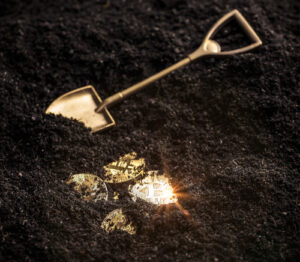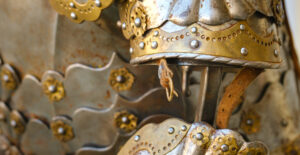
In South Africa, gold isn’t just a resource, it’s memory, fear, and sometimes a secret. Across suburban gardens, quiet rural properties, and ageing family homes, there’s a silent undercurrent of whispers, that somewhere beneath a vegetable patch or under cracked concrete, a stash of gold lies hidden, buried decades ago and long forgotten, or deliberately concealed.
These are not the glossy Krugerrands lining display cases in posh Sandton jewellery stores. These are hoards, stashed coins, bullion, or jewellery sealed in tins, safes, or PVC pipes, hidden away during uncertain times. Stories of buried gold surface quietly at estate auctions, in legal offices handling wills, and among metal detector hobbyists sweeping dusty fields outside Pretoria or Bloemfontein.
The history stretches back. During apartheid, particularly in the 1980s, political tension and banking instability led many to distrust formal financial institutions. Families who feared government seizure of assets, or who simply didn’t want their wealth on record, took to hiding it. Gold, unlike paper money, doesn’t degrade. It can be wrapped, sealed, buried beneath a tree, and forgotten, or deliberately erased from memory, to protect both the gold and its owners.
Some of these hoards were meant to be temporary. A few months hidden in the backyard until the economy stabilised. But over time, as generations moved on and memories faded, many stashes were simply lost to time. Estate attorneys in Johannesburg speak in hushed tones about unexpected finds. A probate file might reveal no mention of assets, but when new homeowners dig up an old fig tree to re-landscape the garden, a sealed metal box surfaces, heavy, rusted, unmistakably valuable. Often, these discoveries never make the news. Quiet negotiations happen. The gold is cashed in discreetly or passed down like a family secret.
In places like Krugersdorp or Kimberley, urban legends swirl around entire fortunes hidden in abandoned mine worker hostels or beneath homes once owned by gold traders. Some stories are pure myth, ghost tales to tell around braais, but others have a grain of truth. Metal detecting clubs in South Africa regularly share photos in private groups, a glint of gold unearthed from deep, sandy soil. Sometimes it’s an old coin. Other times, something larger.
The psychology behind hoarding gold runs deeper than just fear. In a country where wealth has always been fraught with inequality and uncertainty, burying tangible assets was often as much about preserving family legacy as it was about security. Land can be seized. Accounts frozen. But a gold ring tucked beneath the roots of a lemon tree? That could outlast governments. And this isn’t just a South African story. Globally, gold hoards turn up in surprising places, under floors in London, in barn walls in the U.S., but in South Africa, the link to apartheid-era paranoia gives it a sharper edge.
What’s striking is the mix of technology and folklore now involved in searching for these hidden treasures. Companies offering professional ground-penetrating radar services are increasingly booked by families renovating older homes, hoping to confirm or deny family legends. Meanwhile, hobbyist metal detectorists use advanced gear to comb through public spaces, abandoned farms, dried-up riverbeds, and the outskirts of old mining towns.
There’s an unspoken etiquette in these circles. If a detectorist finds a hoard on public land, do they report it? Technically, South African law around found treasure is complex, especially regarding historic artefacts versus private property. But in practice, most finds stay quiet. Trust is handled among friends, not through official channels.
 For those looking to get involved, it’s not quite as simple as buying a metal detector and heading to the nearest old house. Most hoards are well hidden, buried deep enough to avoid detection, marked by subtle clues only the original owner would recognise. A bent nail in a wooden fence. A specific rose bush planted as a marker. And many have likely been lost for good, either decayed or destroyed during home renovations.
For those looking to get involved, it’s not quite as simple as buying a metal detector and heading to the nearest old house. Most hoards are well hidden, buried deep enough to avoid detection, marked by subtle clues only the original owner would recognise. A bent nail in a wooden fence. A specific rose bush planted as a marker. And many have likely been lost for good, either decayed or destroyed during home renovations.
Yet the idea persists. Every so often, stories break through. In 2023, a home renovation in a northern Johannesburg suburb uncovered a stash of gold Krugerrands and jewellery, hidden beneath concrete tiles in the kitchen. The family who found it reportedly turned it over to the police, unsure of the legal implications, but quietly, locals said they doubted everything was reported. That’s part of the mythos, for every hoard found publicly, there are ten more found quietly, kept in a safe, sold off piece by piece.
What draws people to these stories is the idea that wealth might literally be underfoot. It’s wealth unaccounted for by banks or tax agencies, wealth tied to personal history rather than corporate wealth gaps. There’s a romanticism to it, but also something deeply human, a reminder that sometimes, survival means thinking beyond systems and keeping what matters physically close.
As South Africa’s digital economy expands, some might see gold hoards as relics of a paranoid past. But for many families, especially those with histories tied to resistance or marginalised communities, the practice holds lingering relevance. In an age of crypto and bank apps, there’s still something unshakable about the weight of real gold in your hand. There’s also an aesthetic to these hidden stashes. Unlike bank vaults, they aren’t cold and clinical. They’re personal. Wrapped in old family linen. Stored in repurposed coffee tins. Hidden beneath the most ordinary things, a garden path, a chicken coop, an unused fireplace.
Ultimately, the secret world of South African gold hoards speaks to a national psyche shaped by uncertainty, resilience, and creativity. It’s not about greed or criminality. It’s about security in its rawest form, keeping a part of your story buried, just in case.



